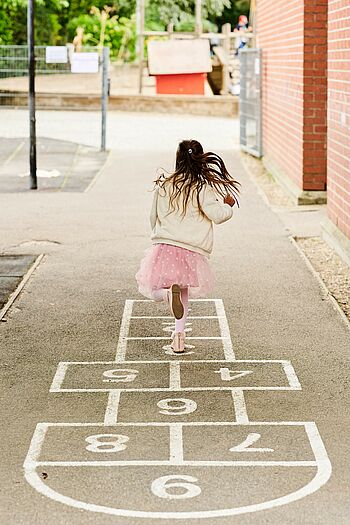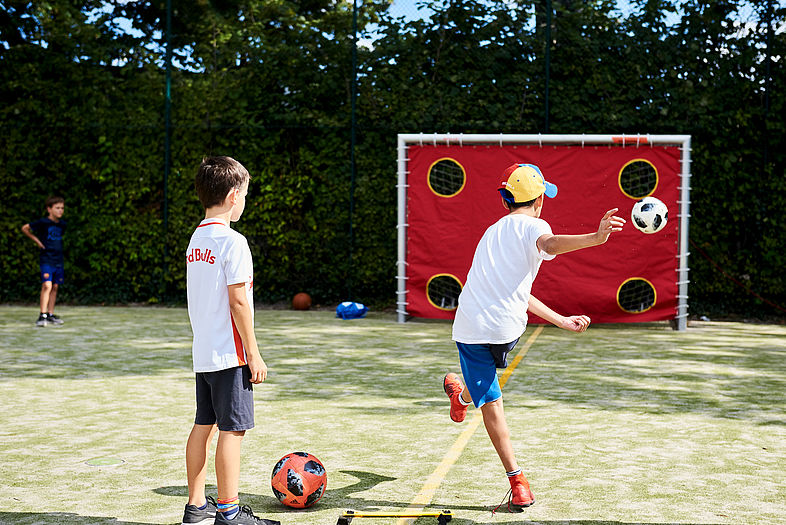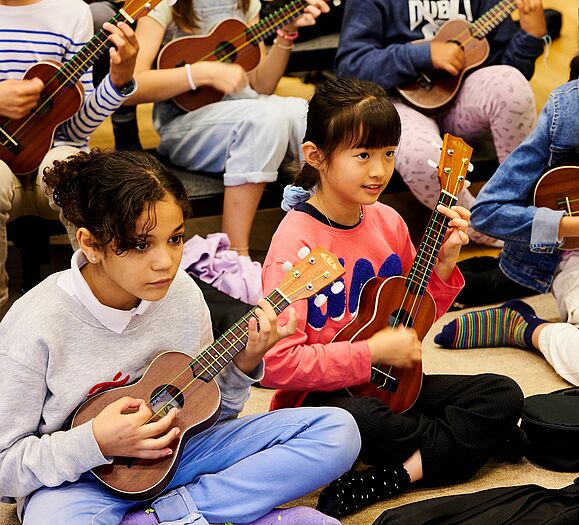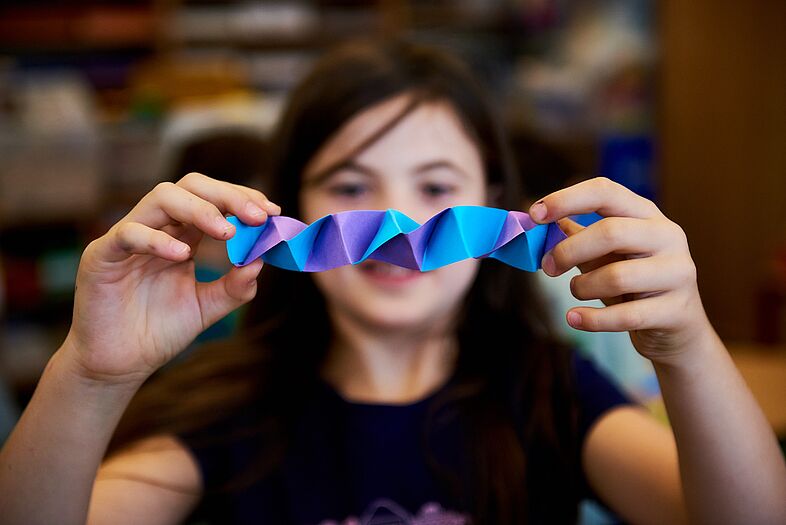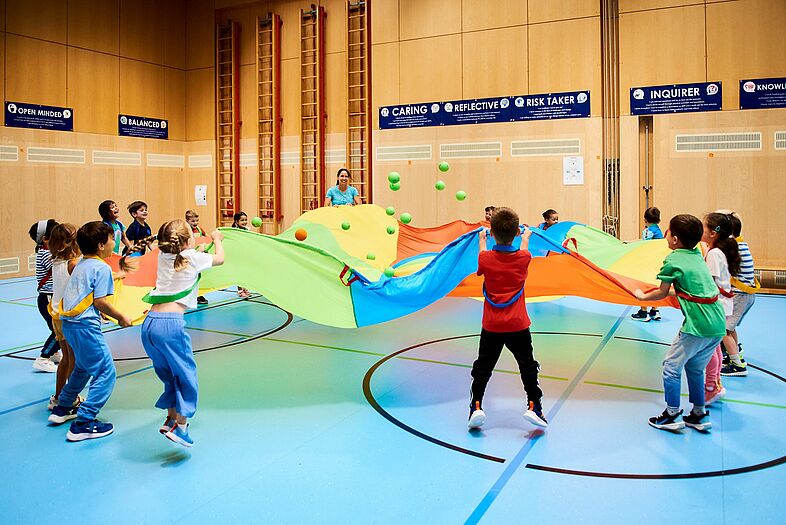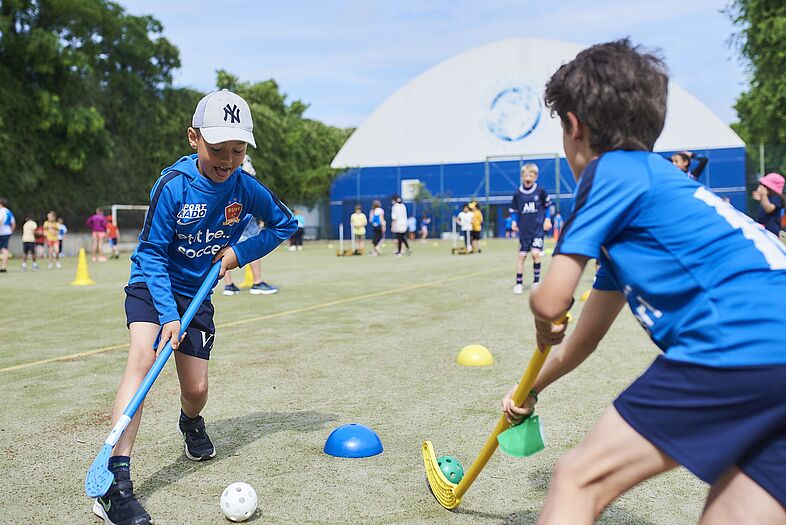
Primary School
Welcome to the Primary School
Vienna International School’s Primary School is a special place to develop student learning. We are in every sense a truly international school, with children from over 100 nationalities playing and learning together. The vast majority of our students are learning English as an additional language. We have strong English Language Acquisition (ELA) and other Language Acquisition programmes which support students in their learning and improvement of English. All students learn German from age five, and over 20 additional languages are supported through our Mother Tongue and Parents Assisting Learning (PAL) programmes. In addition, individual learning needs are supported by our Learning Support department and Primary School Counsellor.

Our specialist music, art, physical education (PE) and library teachers ensure that students’ skills, knowledge and understanding in all subject areas develop under throrough guidance and expertise. Our facilities allow students the space and opportunity to explore and inquiry, as do lessons with our resident Science Expert in our Outdoor Learning gardens.
At the heart of all that we do in the Primary School is the International Baccalaureate’s Primary Years Programme (PYP).
The PYP is an international curriculum that the Primary School here at VIS has played an important role in creating and developing. This curriculum develops the academic, social, physical and emotional skills, knowledge and understanding of each student. Our dedicated and experienced teachers contribute to this learning journey with expertise and passion.
The Primary School is a busy place, with students involved in a wide range of different experiences throughout the year, including well-structured excursions at all levels. Our Connected Learning programme ensures that students have individual access to digital tools, and a dynamic After School Activities programme provides further access to sport, science and more.
At VIS we believe in learning that develops inquiring, involved and inspired students. I look forward to meeting you and discussing with you the ways in which VIS can contribute to the learning and development of your child.
Kind regards,
Chad Wood
Primary School Principal
Primary School Programme by Subject
At VIS students speak, listen, view, present, read and write as they inquire and construct meaning. English Language (Language A) is taught in relevant, authentic and meaningful contexts. A student’s prior knowledge and understanding serve as the basis for future teaching and learning. Through the integration of a variety of instructional strategies, our students are empowered to learn language, learn about language and learn through language. Younger students learn in a language-rich environment in which a strong focus on oral language is maintained. Through play, a variety of learning experiences and conversation, children are invited to talk, listen, read and write for a variety of authentic purposes.
English Language Acquisition (ELA) and English B "Language is the medium in which teaching and learning take place in schools; the medium through which we transform and develop our thinking about concepts; and in this way language and content are inextricably linked" (Halliday, 1993)
The Language Acquisition programme has been designed to meet the needs of students who have English as a second or additional language. Our goal is to develop English language skills, which allow children to be successful in their academic work as well as in everyday communication. We have adopted the IB language continua in which is organised in phases.
The Primary School offers a discrete programme for the IB PYP Language Scope & Sequence Phase 1 and 2. Students in the IB PYP Phases 3 and 4 are supported in the classroom.

We recognize that language is developmental and is fundamental to all learning. All students from ELC to Grade 5 participate in our Primary School German Language Programme, which is based on the IB Language Framework.
Lessons are taught by German language teachers in grade level groups.
In the Primary School we incorporate listening, speaking, reading and writing in stand-alone units as well as units integrated into classroom units. Especially in the German B programme there is a focus on oral language development, including listening and speaking through role-play, games, books, songs, listening and speaking activities, digital resources, online games and practice sites. In the German A programme, there is a focus on reading, creative writing, the writing process, grammar and spelling of high-frequency words. Standardized assessments and state-approved materials are used for various groups, where appropriate.
All German A levels follow the Austrian German Language Curriculum and the Bildungsstandards. All German B levels follow the Austrian German as a Foreign Language Curriculum.
For more information about the German programme in Primary School, please click here.
VIS was a pioneer amongst international schools in recognizing the importance of additive bilingualism. A large number of research studies show very clearly that bilingualism can increase children’s language abilities and help their progress in school.
Both the Primary and Secondary schools at VIS are truly international in that the majority of our students speak a language other than English as their first language. Mother Tongue lessons in a wide range of languages are facilitated, as well as an increasing book collection in the school libraries. The Primary School offers over 3000 books in 60 different languages.
In today's increasingly technology-based society, knowledge and understanding of mathematics is becoming ever more important in many aspects of everyday life. The goal of the Primary School Mathematics Curriculum is to structure mathematics education so that our students experience the enjoyment and fascination of mathematics and see the value and importance of it as they gain confidence and skills.
At each grade level, the study of mathematics equips students with understanding, knowledge, skills and practices in the main strands of the curriculum: Number, Measurement, Shape and Space, Data Handling and Pattern and Function. Students progressively develop their abilities to think critically, solve problems of various kinds and communicate their thinking effectively.
Science can be used to provide explanations and models of behaviour for phenomena and objects around us. It can also be used to investigate the interrelationships between the natural, physical and material worlds. The study of science as taught in the Curriculum and supported by our resident Science Expert and Outdoor Learning Gardens can be used as a vehicle for teaching critical-thinking skills and as a way of exploring the world. The development of ways of investigating and using evidence enables students to interact with the world around them.
People all over the world have more similarities than differences because our basic human needs are the same. It is how we meet these needs and interact with our environment that makes us different. Through learning about Social Studies integrated in the Curriculum, students develop from having an understanding of their personal and cultural identities to gaining a greater awareness and understanding of different peoples across place and time. They also develop an understanding of people’s relationship with and responsibility toward the environment.
PSE is concerned with the ongoing development and growth of the individual in respect to feelings, beliefs and behaviours, and how they interrelate. It also considers the interaction of the individual within various communities. Well-being is intrinsically linked to all aspects of a student’s experience at school and beyond. It encompasses physical, emotional, cognitive, spiritual and social health and development, and contributes to an understanding of self, to developing and maintaining relationships with others, and to participation in an active, healthy lifestyle. PSE is integral to teaching and learning in the PYP and is embodied in the IB learner profile that permeates the programme and represents the qualities of internationally-minded students and effective lifelong learners. The Vienna International School community strives to provide a stable encouraging environment as we believe a gradual mastery of one's own feelings allow us to take action and initiate support of others.
PE has an important role to play in various aspects of human development: physical, social, personal and emotional. In the Primary School, these aspects are developed by giving students the opportunity to learn about and through movement. Students experience a wide variety of physical activities to help develop their movement skills. Through these activities, students can increase their confidence and cooperative skills. They develop an understanding of the role of physical activities for communities and individuals.
Music
Music contributes to the development of the whole child. Learning about music can lead to a life-long desire to enjoy and learn about music. Music touches the mind, body, and spirit and is a powerful force throughout our lives. It can help us develop an appreciation and understanding of ourselves and of cultures of the world. Through listening, performing, and creating, opportunities are created for students to express themselves and to gain a deeper understanding of music. Furthermore, discussion, analysis and reflection help students become educated consumers of music. The study of music is the study of a basic form of communication. Students will join together in musical activities using their voices, bodies and instruments. Each student in the VIS Primary School is supported in reaching their musical potential by developing musical reading abilities and performance skills.
Drama
Drama contributes to the development of the whole child. Learning about and through drama can lead to a life-long desire to enjoy hands-onexperiences. Drama touches the mind, body, and spirit and is a powerful force throughout our lives. It can help us develop an appreciation and understanding of ourselves, others and the many cultures of the world. Drama is a process of responding to observations, ideas, feelings and other experiences. Skillful, thoughtful and imaginative experiences liberate and deepen the students’ power of expression and challenge them to reconcile the powers of emotion and intuition with intellectual ability. VIS has expanded the Drama Programme in the Primary School since the 2019/20 school year; including a full-time drama teacher for Grades 1 to 5, and a dedicated drama space.
The Vienna International School prides itself on a very strong and successful Visual Arts programme. We encourage and support students to be confident and able to develop independent art projects from concept to product in the area that they choose, mastering basic art techniques and skills, solving problems and being able to reflect on their own journey.
In Visual Arts in the Primary School, the student is the Artist. Our pedagogical approach is focused on supporting divergent thinking and teaching for creativity. We provide authentic art-making opportunities for students and we encourage them to become more responsible for their own creative process through paired guided inquiry, solving problems, interpretation of a theme and choosing and manipulating materials with purpose.
Primary School Programme by Grade
At VIS, we pride ourselves on having a strong Early Learning Years programme, which consists of our Early Learning Centre (ages 3-5) and Grade Primary (ages 5-6), with six classes led by class teachers and Educational Support Staff (ESS). We emphasise learning through play, and each school day and week is planned to provide the children with stimulating activities, outside playtime, and lessons with our specialist teachers in Music, PE, German, Library and Connected Learning, as well as our resident Science Expert and Learning Support team members.
We recognise that children are naturally curious and use experimentation and exploration to make sense of the world around them. Our programme is inspired by the Reggio Emilio approach, which is student-centred and constructivist and utilises self-directed, experiential learning in a relationship-driven environment. We emphasise the growth of children's inquiry, creativity, curiosity and imagination, while the development of basic skills is carefully nurtured.
Our hands-on and active learning, as well as the support from our English Language Acquisition team members, makes it easy for children with differing levels of English to access the curriculum. Through the organisation of the classroom and careful planning, our staff ensure that all students have the opportunity to become confident, skilled and independent learners.
Our programme for Learning in Grades 1-5 in the Primary School is relevant, rigorous and engaging. We have four classes in each grade with Educational Support Staff (ESS) in Grades 1 and 2 and specialist teachers in German, Music, PE, Library, Connected Learning, Visual Art and Drama. Our resident Science Expert supports students in class and in our Outdoor Learning Gardens as do our Learning Support and English Language Acquisition team members.
Our well-documented curricula and well-appointed teaching spaces support the effective implementation of the International Baccalaureate Primary Years Programme (IBPYP). Through its inquiry-led, transdisciplinary framework, the PYP challenges students to think for themselves and take responsibility for their learning as they explore local and global issues and opportunities in real-life contexts. Through the study of six transdisciplinary themes of global significance each year, students deepen their learning by developing their conceptual understandings and strengthening their knowledge and skills across and beyond subject areas. PYP students learn how to take control of their learning, and teachers collaborate to deepen student- learning and increase their confidence and self-motivation. The whole school community, including parents, are viewed as partners in learning, all actively contributing to a holistic and valuable educational experience.

